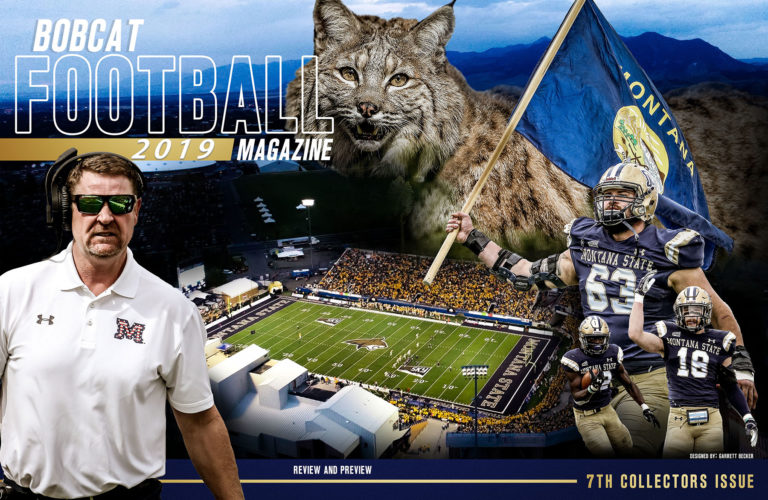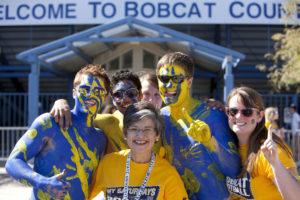“People would stop and say, ‘Your president is amazing—I’ve heard so much about your university.” ~ Dr. Robert Mokwa, Provost
You may be surprised to learn that as a schoolgirl in Mayagüez, Puerto Rico, Montana State University President Waded Cruzado was in trouble rather frequently. The problem was boredom: Waded (an Arabic word meaning ‘love,’ chosen by her father) had learned to read at three years old at her maternal grandmother’s knee and, using a small blackboard and desk, would pretend to be a teacher to her dolls and stuffed animals. At five she was helping her grandfather on his coffee farm and assisting her stepfather in the coffee mill he managed (as an adult, she appreciates a good cup of joe and enthuses: “I can tell you great coffee from the aroma). But the industrious little girl found her school lessons a bit, well, elementary. So, the parochial school she attended came up with a fitting punishment for her misbehavior: she had to read novels aloud to a blind nun. “I’ll be forever indebted to that nun,” exclaims Dr. Cruzado. “That experience taught me a love of literature!” (She would later graduate from the University of Puerto Rico at Mayagüez magna cum laude with B.A. in Comparative Literature).
“All my life I’ve been associated with land grant universities,” says Dr. Cruzado, who was the first person in her family to attend college. “Mayagüez is the equivalent of Bozeman in being home to a land grant university. My passion started there and grew.” She began graduate school at Purdue (another land grant university), but marriage brought her to Texas, where she attended the University of Texas at Arlington, earning her M.A. in Spanish Language and Literature in 1984 and her Ph.D. in the humanities in 1990. She later returned to the University of Puerto Rico, then in 2003 accepted an appointment as Dean of the College of Arts and Sciences at New Mexico State University, also a land grant U. “So, three land grant universities have marked my life,” she states.

While Dr. Cruzado has a long list* of accomplishments at Montana State, she is most proud of MSU’s growth, based on the conviction that the mission of the land grant university is as important as it was156 years ago, when the Morrill Act was established. “We are called every day to do three things,” she says, holding up three fingers—teach, research, and reach out to the public. We are here to educate the sons and daughters of working families. I feel incredible satisfaction when I hear students talking about the fact that they realize the value of this land grant university.” And students appreciate her enthusiasm and vitality: “From what I’ve seen—and I’ve met her personally—she never lets anything get her down or depressed,” sayssophomore Caitriauna Olson, a second year Hilleman Scholar studying Environmental Biology.“She’s always pushing for the positive and good goals.”
Indeed, when she sets her mind on a goal, Dr. Cruzado goes at it with gusto. In 2010, shortly after she took the helm, ten million dollars was raised in a record amount of time for a 7,200-seat renovation of the south end zone of Bobcat Stadium, a project completed in just 10 months. Eight years later, plans are underway for a facility in the north end zone for operations, a locker and weight room, and coaches’ offices (currently located in the Field House), projected to cost $16+ million. “Once vacated from the Field House, there will be brand new academic facilities for student-athletes in that location,” says Athletic Director Leon Costello. The master plan came from discussions between him and Dr. Cruzado about taking a fresh look at athletic facilities. “He put together a group and had countless meetings with faculty, staff, alumni, fans and community members,” says Dr. Cruzado. “We asked: What do you envision for MSU in general and MSU athletics in particular? This plan is the product of incredible input and support.”
While some may balk at a ‘big ask’ for more money for sports, Dr. Cruzado is quick to counter: “We welcome everybody to come tell us best practices, tell us about another school doing this or that, and we’ll consider it. We also have an incredible number of generous donors who feel passionate about scholarships.” She cites Jake Jabs’ gift of $25 million for the College of Business and the $50 million from Norm Asbjornson for the College of Engineering. “If there is an imbalance, it’s in favor of academics. First and foremost, we’re here to educate students and I know Leon is very aware of that. I’m proud of what we do at MSU.”
Tact may be one of Dr. Cruzado’s greatest gifts: Holding what is arguably the most powerful job in Bozeman,she comes across with sincerity when asked about controversial topics. Case in point: should academic tests and legal documents in the U.S. be in both Spanish and English? “There is great value in learning more than one language, period. It opens doors and facilitates relationships. It’s not only the language—it’s that language will immerse you in a different culture and way of looking at things. Your brain functions in different ways [when you speak a foreign language]. I was just having a conversation with ceramics students who went to Brazil to help build a wood-burning kiln. To a person, they all said, ‘I wish we would have spoken Portugese.’ And that goes both ways. When I go back home I get bored; here I’m learning new words and ways to pronounce things every day.” Dr. Cruzado’s son, Dr. Gerald Mazo, a hospital physician, and her daughter, Brenda, a schoolteacher (and the mother of her two grand-daughters, Aurora and Celeste) live in Puerto Rico. All are fine, she reports (after Hurricane Maria devastated the island), though shaking her head and adding with dismay; “it’s very hard, very difficult there.”
Meanwhile, here in Bozeman, Dr. Cruzado continues building bridges. Once a semester she holds a breakfast with staff, faculty and students, as well as with small groups of department heads. “It’s a fascinating opportunity for me to learn about projects they care about,” she says. Their opinions do influence the manner in which we operate.” And there’s the monthly Breakfast with Rob (that would be Rob Watson, Superintendent of Bozeman Public schools). “We’re in the same business, after all,” she remarks. She also hosts regular breakfasts with Bozeman Deaconess Hospital, the county commissioner, and the city manager. Provost Bob Mokwa recalls one of MSU’s oldest faculty members telling him; “’I’ve been here through six presidents and Cruzado has done more than the others combined.’ “I think it’s true,” says Mokwa. “She’s doing what a president should be doing—really championing the university and students. At a recent American Conference on Education in San Diego, I met presidents and provosts from all over the country. People would stop and say; ‘Your president is amazing—I’ve heard so much about your university. I was shocked. It happened time and again.”
It doesn’t surprise Samantha Morris, an MSU sophomore studying Agriculture Education Communications. “President Cruzado has definitely been very inspirational to us students and she always loves to be involved with any organization that’s on campus, whether they’re brand new or they’ve been established for many years,” she says. Dr. Cruzado is not only dynamically involved at Montana State: she’s also a recognized national leader. After the Boston Marathon bombing, she was tapped by the University of Massachusetts, Dartmouth to chair a three-person task force on the recruitment and support of international students, and emergency planning. “We looked into whether the University had handled it well,” she comments. “We met with the University Police, department heads, deans, faculty members and administrative officials, and learned that it is not dissimilar from what we learned as a Nation from 9-11. Sometimes the left hand doesn’t know what the right is doing. It is important for us as universities to build a cohesive system so information is flowing—that was our biggest finding,” she states, noting that nothing in how the University was operating made it susceptible. “Universities are complex organizations and it’s important to build networks; we need to ask, ‘how are we taking care of our students? What tools, mechanisms, policies and procedures are in place, so we can communicate and respond adequately’ [if concern is noted about an individual]?” Those components are well established at Montana State, she assures.
Ms. Cruzado is also on the Board for International Food and Agricultural Development, a seven-member advisory council (appointed by President Barack Obama) that advises the U.S. Agency for International Development on agriculture, nutrition, and rural development issues related to global food insecurity. “I had the incredible opportunity to serve,” she reflects. She was reappointed after her three-year term expired last year, so is still working on projects such as helping nations build food security and eradicate world hunger. “For me that’s an important mission, and the MSU College of Agriculture plays an important role in feeding the world,” she states, and expresses enthusiasm about MSU’s Sustainable Food & Bioenergy Systems program. She is proud of the improved quality of food on campus. “Any time, any day, come to our dining halls—you’ll see a lot of locally produced food,” invites Dr. Cruzado, who enjoys cooking (Puerto Rican, Italian, southwestern dishes, desserts—that’s my problem—I love everything!) and spearheaded the renovation of the award-winning Miller Dining Hall. “Interdisciplinary interactions help forge relationships with local producers, who can identify ways to increase production and profitability,” she states, adding that this will be expanded through MSU’s new Hospitality Management program. “Imagine the positive impact in the community! These academic programs are great; they give students the tools they need to change the world!”
Junior Tyana Murphy, anequine science major in the pre-veterinary program and Phi Beta Kappa member is out to change the world and appreciates the fact that her university President “always brings in lots of great speakers to inspire us and tell us their life story and how they’ve achieved what they have.”
Diminutive in stature, this woman is herself an inspiration. A virtual dynamo, she is unfazed when the question of height comes up. “When my name was first announced as a finalist for this position, a local reporter called and asked; ‘Is it true you’re five feet tall?’ She is. On the nose. “Believe it or not, growing up I used to play basketball, volleyball, and ping pong!” She now enjoys watching sports—basketball, baseball, football, the Olympic games. How has she adjusted to Montana’s climate? “I always tell people that, honestly, the most dramatic change was to move from a tropical island in the Caribbean to the high desert—going from one hundred percent humidity to zero. Montana is semi-arid; I got used to cold weather quickly because we have so many sunny days. And the snow is beautiful.” She enjoys snowshoeing, but passes on cross country and downhill skiing. “You only get one pair of these,” she says, tapping her calves. “Besides, in my job I already go a hundred miles an hour, so I don’t’ ski.” She does enjoy taking walks with her dogs, Blanco and Lucy, andloves the performing arts, whether that is dancing, theater, or music. “I try to attend performances whenever I can. I love MSU’s School of Music and I love MSU Shakespeare in the Parks, as well as all the impressive shows produced at the Black Box Theatre,” she says.
A member of the American Comparative Literature Association, and at least six other educational organizations as well as the Alpha Delta Kappa, Delta Sigma Theta and Phi Kappa Phi national honor societies, Ms. Cruzado has a passion for Latin American studies, and taught a course on the Magical Realism associated with the late Colombian authorGabriel Garcia Marquez. “It enabled graduate students to go beyond the concept that it is a Latin American invention; Magical Realism has roots in Russian and French literature as well,” she says, advising not to get her started on the topic, lest her zeal for it take us on a tangent. Where does she get her seemingly boundless energy? “I am energized by the students of Montana State and the mission of trying to improve their lives and the lives of their families through higher education. That is the honest truth. Being a president is a demanding, 24/7 job and it requires a sense of mission and duty to be successful. I get that from being around our students, from seeing both their successes and their struggles.”
Aside from donating money, Dr. Cruzado feels the most important thing MSU supporters can do is come to games. “Be engaged—come be a Bobcat!” she implores. “From that relationship, we can build incredible things. There is no replacement for that. Be part of the Bobcat excitement!
For an overview of Ms. Cruzado’s truly impressive achievements, visit https://prolearningnetwork.cccco.edu/waded-cruzado


